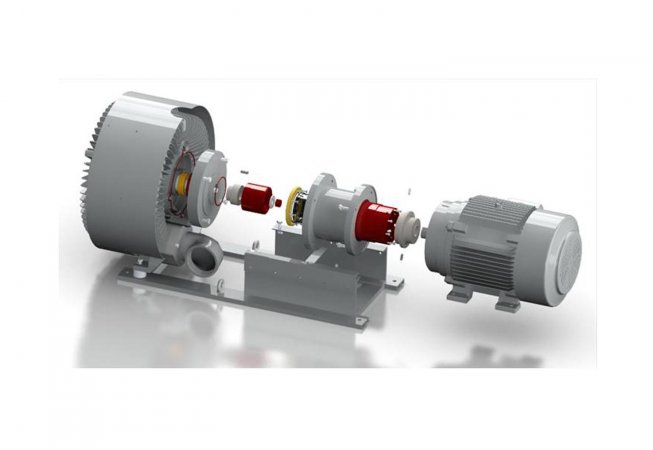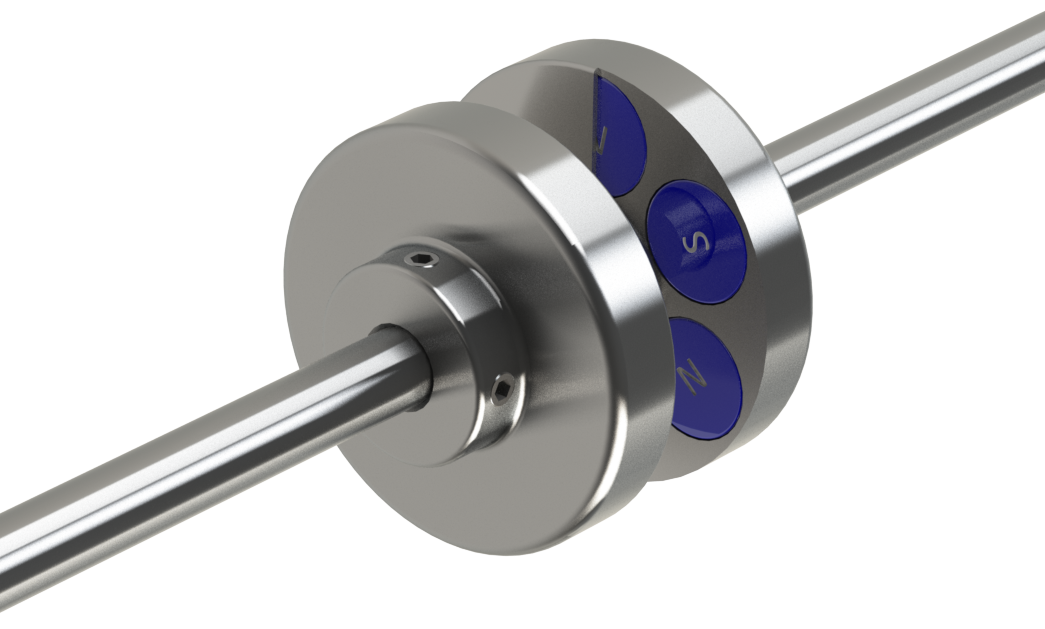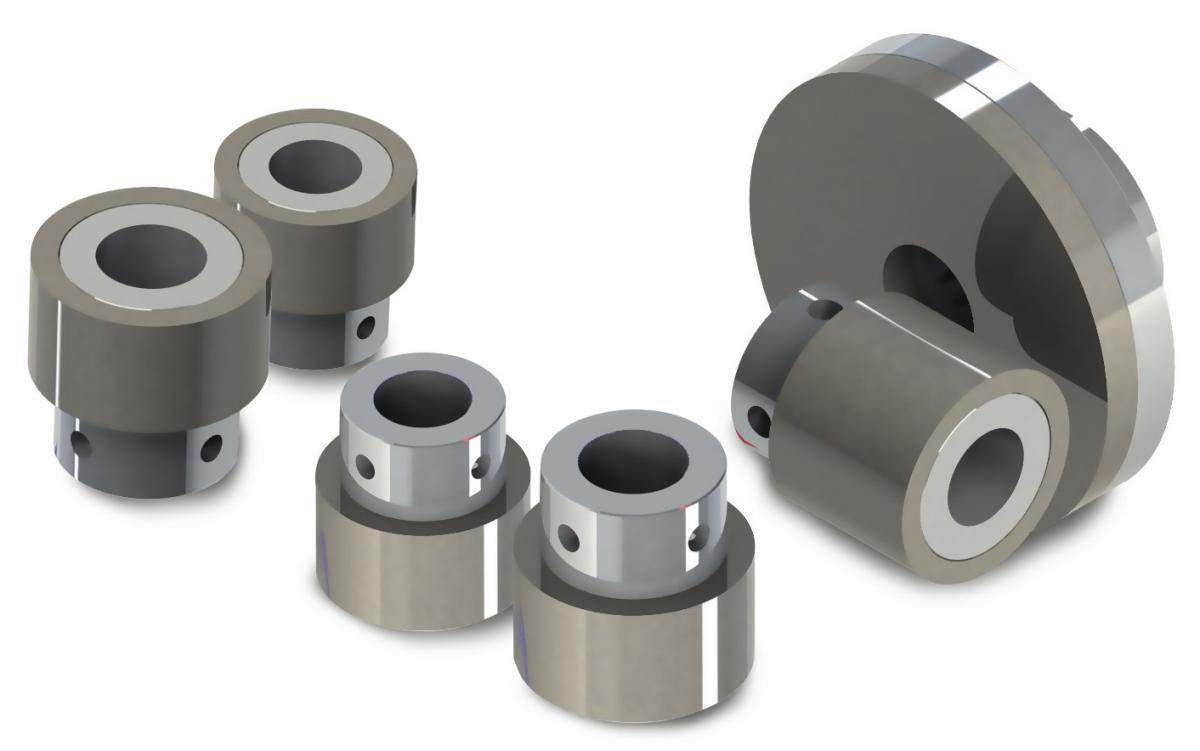Product Description
Made in China custom Magnetic Coupling with High Quality
Introducing our custom Magnetic Coupling, proudly made in China with the highest quality standards. This coupling is designed to provide exceptional performance and reliability, making it an ideal choice for various applications.
Our Magnetic Coupling is crafted using rare earth magnets, ensuring a strong and durable connection. It offers a secure and efficient transfer of power between shafts, eliminating the need for physical contact. This feature not only reduces wear and tear but also minimizes the risk of contamination, making it suitable for sensitive environments.
Ordinary magnetic coupling, working temperature less than 80 ºC, without acid or alkali corrosion environment. Please contact customer service for customization.
| NO. | ФA | ФB | C | ФD | Фa | Фb | Фd | E | F | H | J | K | L | M | P | S | T | V | Фh | Фx | torqueN.m |
| YCL045 | 45 | 38 | 50 | 19 | 33 | 27 | 12 | 32 | 6 | 38 | 5 | 4 | 60 | 4 | 3 | 2 | 5 | 39 | 31 | 65 | 2 |
| YCL060 | 60 | 47 | 58 | 24 | 43 | 35 | 15 | 38 | 8 | 46 | 6 | 5 | 70 | 5 | 4 | 2 | 6 | 48 | 40 | 90 | 6 |
| YCL080 | 80 | 58 | 65 | 28 | 58 | 48 | 20 | 40 | 8 | 50 | 7 | 6 | 80 | 6 | 5 | 4 | 8 | 51 | 55 | 115 | 12 |
| YCL100 | 100 | 70 | 100 | 35 | 72 | 58 | 25 | 72 | 10 | 83 | 8.5 | 7 | 117 | 8 | 6 | 6 | 10 | 84 | 68 | 142 | 45 |
| YCL120 | 120 | 70 | 105 | 35 | 86 | 70 | 30 | 72 | 10 | 86 | 8.5 | 7 | 125 | 8 | 8 | 8 | 10 | 88 | 82 | 165 | 84 |
/* March 10, 2571 17:59:20 */!function(){function s(e,r){var a,o={};try{e&&e.split(“,”).forEach(function(e,t){e&&(a=e.match(/(.*?):(.*)$/))&&1

Can Magnetic Couplings Be Used in Applications Involving Corrosive or Aggressive Fluids?
Yes, magnetic couplings can be used in applications involving corrosive or aggressive fluids, provided that the coupling is constructed using materials that are compatible with the specific fluid being handled. The ability to use magnetic couplings with corrosive or aggressive fluids depends on the material selection and design of the coupling.
When handling corrosive or aggressive fluids, it’s essential to consider the following factors:
- Material Compatibility:
Select materials for the magnetic coupling that are resistant to the corrosive properties of the fluid. For example, stainless steel, Hastelloy, or certain grades of ceramics are commonly used for components that come into contact with corrosive fluids.
- Hermetic Sealing:
Ensure that the magnetic coupling provides a hermetic seal to prevent fluid leakage. The containment shell and other sealing components must be able to withstand the chemical properties of the aggressive fluid.
- Coatings and Lining:
In some cases, coatings or lining materials can be applied to the coupling’s surfaces that are exposed to the fluid. These coatings can offer additional protection against corrosion and ensure compatibility with aggressive fluids.
- Fluid Temperature and Pressure:
Consider the temperature and pressure of the aggressive fluid, as it may influence the material selection and design of the magnetic coupling. High temperatures or pressures can impact the coupling’s performance and material integrity.
- Fluid Properties:
Understand the specific chemical properties of the aggressive fluid, such as acidity, alkalinity, or reactivity. This information is crucial for selecting appropriate materials and ensuring the coupling can handle the fluid’s properties.
- Manufacturer’s Recommendations:
Consult the magnetic coupling manufacturer for their recommendations on material selection and design considerations for applications involving corrosive or aggressive fluids. They can provide guidance based on their expertise and product specifications.
By carefully considering material compatibility and design factors, magnetic couplings can be successfully used in a wide range of applications involving corrosive or aggressive fluids. These couplings offer advantages such as leak-free operation, reduced maintenance, and the absence of wear-prone components, making them suitable for various industries, including chemical processing, petrochemicals, and pharmaceuticals.

Can Magnetic Couplings Be Retrofitted into Existing Systems to Enhance Performance?
Yes, magnetic couplings can be retrofitted into existing systems to enhance performance, efficiency, and reliability. Retrofitting magnetic couplings offers several benefits and is a practical solution for upgrading older systems or replacing traditional mechanical couplings with more advanced technology. Here’s how magnetic couplings can enhance the performance of existing systems:
- Improved Efficiency:
Magnetic couplings operate without direct physical contact, which reduces friction losses and improves overall system efficiency. By retrofitting a magnetic coupling, the system can experience lower energy consumption and increased power transmission efficiency.
- Elimination of Mechanical Wear:
Traditional mechanical couplings with sliding or rolling elements are prone to wear and require regular maintenance and replacement. Magnetic couplings, on the other hand, do not have any physical contact between components, eliminating the need for lubrication and reducing mechanical wear. Retrofitting with a magnetic coupling can extend the system’s lifespan and reduce maintenance costs.
- Hermetic Sealing:
Magnetic couplings offer hermetic sealing capabilities, preventing fluid leakage and contamination. By retrofitting a magnetic coupling, the system can achieve a leak-free operation, making it suitable for applications in industries such as chemical processing, pharmaceuticals, and food and beverage.
- Compatibility:
Magnetic couplings can be designed to be compatible with various systems and applications. Manufacturers offer a range of sizes and configurations to suit different retrofitting needs. Customized magnetic couplings can be engineered to match the existing system’s requirements without major modifications.
- Tolerance to Misalignment:
Magnetic couplings can accommodate a certain degree of misalignment between the driving and driven components. This misalignment tolerance can be advantageous when retrofitting into systems where precise alignment may be challenging to achieve.
- Overload Protection:
Some magnetic couplings come with built-in overload protection features. Retrofitting with such couplings can add an additional layer of safety to the system, preventing damage in case of sudden overloads or excessive torque.
When retrofitting magnetic couplings into existing systems, it is essential to work with experienced engineers or manufacturers to ensure proper sizing, alignment, and integration. Conducting a thorough evaluation of the system’s requirements and the benefits of the retrofit will help determine the best magnetic coupling solution for enhancing the performance and longevity of the existing setup.

How to Select the Right Magnetic Coupling for Specific Fluid Handling Systems
Selecting the right magnetic coupling for fluid handling systems requires careful consideration of various factors to ensure optimal performance and reliability. Here are the key steps to help you make the right choice:
- Fluid Properties:
Understand the properties of the fluid being handled, including its viscosity, temperature, and corrosiveness. High-viscosity fluids may require magnetic couplings with stronger torque capabilities, while corrosive fluids may necessitate materials with excellent chemical resistance, such as stainless steel or specialized coatings.
- Flow Rate and Pressure:
Assess the required flow rate and system pressure. Magnetic couplings must be capable of transmitting the necessary torque to handle the fluid flow at the desired pressure levels. High-pressure systems may require magnetic couplings with enhanced strength and reliability.
- Misalignment Compensation:
Consider the potential misalignment between the motor and pump shafts. Magnetic couplings are known for their ability to accommodate misalignment to some extent. Assess the expected misalignment in your fluid handling system and choose a coupling with appropriate flexibility to compensate for it.
- Sealing Requirements:
Examine the sealing requirements of the fluid handling system. Magnetic couplings can provide hermetic sealing, preventing fluid leakage or contamination in critical applications. Ensure that the chosen coupling offers the necessary level of sealing to suit your system’s needs.
- Torque and Speed Ratings:
Check the torque and speed ratings of the magnetic coupling. Ensure that the selected coupling can handle the required torque and speed for your fluid handling application. High-speed pumps may require magnetic couplings specifically designed to minimize eddy current losses.
- Environmental Conditions:
Consider the environmental conditions in which the magnetic coupling will operate. Factors such as temperature extremes, humidity, and exposure to harsh chemicals can impact the coupling’s performance and lifespan. Choose a coupling that is designed to withstand the specific environmental challenges.
- System Integration:
Ensure that the magnetic coupling can be easily integrated into your fluid handling system. Consider factors such as coupling dimensions, mounting options, and alignment procedures. A well-integrated coupling will simplify installation and maintenance processes.
- Manufacturer Reputation:
Work with reputable manufacturers with a proven track record in producing high-quality magnetic couplings for fluid handling systems. Check for certifications and industry compliance to ensure the coupling meets required standards.
By carefully evaluating these factors and selecting a magnetic coupling that aligns with the specific fluid handling system requirements, you can ensure reliable and efficient operation while minimizing the risk of downtime and maintenance issues.


editor by CX 2024-01-10